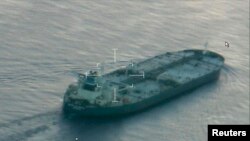A vessel called United Kalavryta, containing 1 million barrels of crude oil from Kurdistan, is sitting in international waters off the coast of Galveston, Texas. The government of Iraq considers the shipment illegal, because Kurdistan, not Baghdad, approved its sale. A U.S. judge had ordered the ship seized, but it's currently untouchable in international waters.
The ship full of disputed crude came to Galveston, Texas, about two weeks ago and contacted the U.S. Coast Guard for a pre-arrival safety inspection.
US Coast Guard spokesman Andy Kendrick said the ship was, at that time, some 100 kilometers off the coast.
"We went out to where they were, did our exam, it is basically just a comprehensive exam to check all the equipment -- life-saving equipment, engineering, navigation, the ship's cargo transfer system and safety mechanisms associated with that," said Kendrick.
Kendrick said the ship passed all inspections and was approved to move into a zone used for what is called "lightering," a process whereby smaller vessels transfer the oil to storage tanks on shore since the ship is too large to enter the harbor.
But attorneys representing the government of Iraq contacted all the lightering companies in the Houston-Galveston port areas threatening to sue them if they took part. Baghdad contends that the oil, worth about $100 million on the open market, was illegally transferred from Kurdistan to a port in Turkey.
A federal judge ordered the vessel and its cargo seized. But since it never entered US waters there was no way to enforce that order.
At the U.S. State Department, spokeswoman Jen Psaki backed Iraq's claim to the petroleum. "Our policy certainly has not changed; we believe that Iraq's energy resources belong to the Iraqi people and certainly have long stated that it needs to go through the Iraqi government."
But Psaki said the US government has no plan to intervene as long as the ship remains outside its jurisdiction.
Joan Mileski, director of the Department of Maritime Administration at Texas A&M University in Galveston, said no government can legally touch a ship at sea.
"We have agreed, by treaty, globally, that we let everybody move in and out of international waters. We all agreed to that, on the planet. So if it sits out in international waters, there is nothing you can do about that," said Mileski.
But she said keeping a ship afloat indefinitely, with no place to unload the cargo is costly.
"I am sure the owner of the ship is annoyed to no end because every day it stays out there he is losing $70,000 to $80,000," she said.
Mileski said the crew members on the tanker also have rights under international law and the terms of their contracts. At some point, she said, the ship may run out of fuel, food and water.
But to plea for humanitarian aid, she said, the captain or crew will have to communicate with someone on shore.
"If they have the ability to do ship-to-shore phoning, which they probably do, they can, but they don't have things like Internet or cell phones or anything like that because they are too far out," said Mileski.
Not much is known about the owner of the Union Kalavryta, which is flagged in the Marshall Islands. The purchaser of the oil is listed as Talmay Trading, a company registered in the British Virgin Islands, with offices in Dubai. This company could be serving as the intermediary for another buyer. There has been no response from the company for comment.
Kurdistan is an autonomous region in Iraq that has on a few occasions shipped oil from its own fields to buyers in other countries. The Kurds argue that disruptions to the Iraqi system have forced them to find alternatives.




